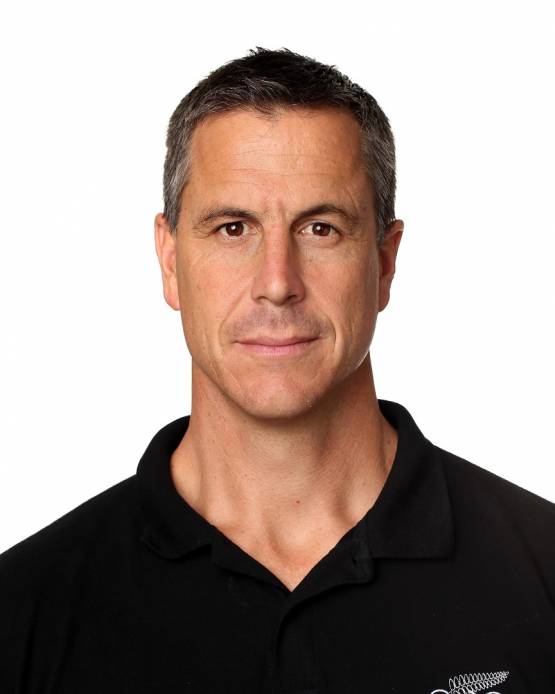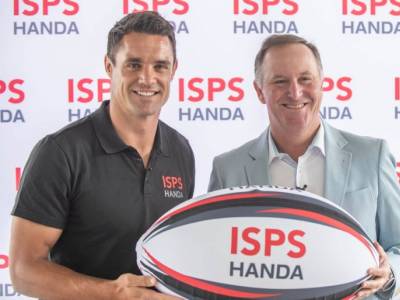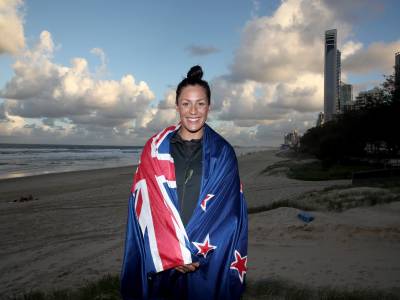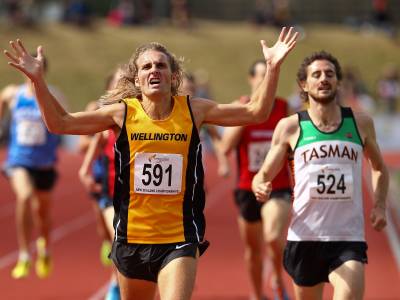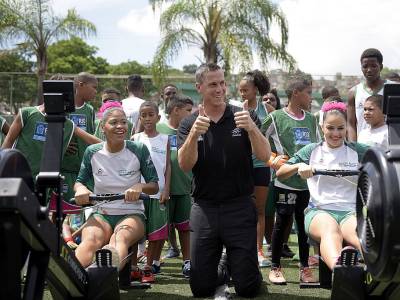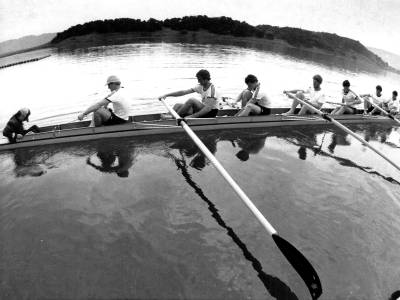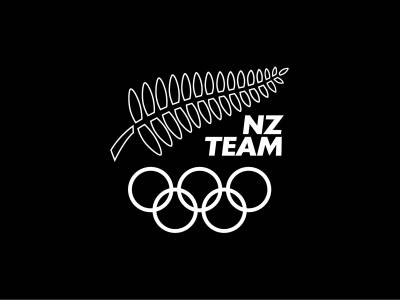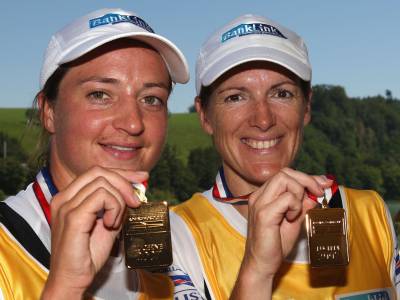Rob Waddell continued a long line of outstanding New Zealand single scullers when he won world titles in 1998 and 1999, and capped his career with an Olympic gold medal at the 2000 Sydney Olympics.
Ever since the pioneering days of Billy Webb, Dick Arnst and Darcy Hadfield, New Zealand has produced sculling champions, including 1991 world lightweight women's champion Philippa Baker and Mahe Drysdale of a more recent generation, but it's doubtful if any were more dominant than Waddell.
At two metres tall, Waddell was an impressive physical specimen. It was another outstanding New Zealand single sculler, Eric Verdonk, who once said: “Rob just has a bigger engine than the rest of us.”
Waddell grew up on a King Country dairy farm and went to King's College in Auckland, where rowing was a sport with strong traditions. During his teens Waddell was tall and rather gangly, but he filled out. He took up rowing in his fourth form year and was soon in the school's top rowing eight. He was also a member of the First XV and was a leading public speaker at the school.
In 1992, when he was only 17, he made the New Zealand junior rowing team, and was asked if he was available for national under-23 selection. He declined because he had won a 10-month scholarship to Japan. He used his time there well, learning Japanese and judo, at which he reached black belt class.
From 1993-97 Waddell studied at Waikato University, where he gained an honours degree in management studies. He made steady and sometimes startling progress in rowing, even though in 1993 he began experiencing trouble with an irregular heartbeat. The cause of the problem was not diagnosed until two years later.
There was a fortunate spin-off to the situation because, worried that his condition might cause him to let down his team-mates during a competition, he began to concentrate more on single sculling, with dramatic results.
In 1994 Waddell and Ian Wright picked up the coxless pairs bronze medal at the Commonwealth championships in Ontario. At the world championships at Indianapolis that year, Waddell and Wright contested the coxed and coxless pairs, but were unable to break into the medals. The following year Waddell moved to a coxless four for the world championships in Tampere, Finland, but was again unable to grab a medal.
With the move to single sculls - and new medication - in 1995, Waddell, just 20, became the youngest winner of the New Zealand single sculls title. At that year's pre-Olympic regatta in Lucerne, Waddell was in the New Zealand eight that failed to qualify for the Atlanta Olympics. So he focused on the single sculls at Atlanta, hinting at future glory by finishing seventh among the 22 entrants.
Thereafter he enjoyed almost uninterrupted success in one of his sport's blue riband events. He won the Australian title at Lake Barrington in 1997, and then moved to the highest level in 1998 by claiming the world single sculls title at Cologne, Germany. He retained his title in 1999 at St Catharines, Canada - he also won a world indoor title in record time that year - and went to the 2000 Sydney Olympics a heavy favourite.
Despite the pressure, he rowed outstandingly in Sydney, winning his heat and semi-final in fine style. He was in a class of his own in the final, clearing out from the best single scullers around to win by 1.5s. He was accorded the honour of carrying the New Zealand flag at the closing ceremony.
Waddell's emphatic victory earned him his third consecutive Halberg Award - he became the first person to win the award in three successive years.
His successes reflected not only his rare ability, but also the fine coaching he received from former Olympic medallist Dick Tonks.
In 1998 Waddell married leading New Zealand women's single sculler, and three-time Olympian, Sonia Scown, the daughter of former All Black loose forward Alistair Scown. They have three children.
Read more
Rob Waddell continued a long line of outstanding New Zealand single scullers when he won world titles in 1998 and 1999, and capped his career with an Olympic gold medal at the 2000 Sydney Olympics.
Ever since the pioneering days of Billy Webb, Dick Arnst and Darcy Hadfield, New Zealand has produced sculling champions, including 1991 world lightweight women's champion Philippa Baker and Mahe Drysdale of a more recent generation, but it's doubtful if any were more dominant than Waddell.
At two metres tall, Waddell was an impressive physical specimen. It was another outstanding New Zealand single sculler, Eric Verdonk, who once said: “Rob just has a bigger engine than the rest of us.”
Waddell grew up on a King Country dairy farm and went to King's College in Auckland, where rowing was a sport with strong traditions. During his teens Waddell was tall and rather gangly, but he filled out. He took up rowing in his fourth form year and was soon in the school's top rowing eight. He was also a member of the First XV and was a leading public speaker at the school.
In 1992, when he was only 17, he made the New Zealand junior rowing team, and was asked if he was available for national under-23 selection. He declined because he had won a 10-month scholarship to Japan. He used his time there well, learning Japanese and judo, at which he reached black belt class.
From 1993-97 Waddell studied at Waikato University, where he gained an honours degree in management studies. He made steady and sometimes startling progress in rowing, even though in 1993 he began experiencing trouble with an irregular heartbeat. The cause of the problem was not diagnosed until two years later.
There was a fortunate spin-off to the situation because, worried that his condition might cause him to let down his team-mates during a competition, he began to concentrate more on single sculling, with dramatic results.
In 1994 Waddell and Ian Wright picked up the coxless pairs bronze medal at the Commonwealth championships in Ontario. At the world championships at Indianapolis that year, Waddell and Wright contested the coxed and coxless pairs, but were unable to break into the medals. The following year Waddell moved to a coxless four for the world championships in Tampere, Finland, but was again unable to grab a medal.
With the move to single sculls - and new medication - in 1995, Waddell, just 20, became the youngest winner of the New Zealand single sculls title. At that year's pre-Olympic regatta in Lucerne, Waddell was in the New Zealand eight that failed to qualify for the Atlanta Olympics. So he focused on the single sculls at Atlanta, hinting at future glory by finishing seventh among the 22 entrants.
Thereafter he enjoyed almost uninterrupted success in one of his sport's blue riband events. He won the Australian title at Lake Barrington in 1997, and then moved to the highest level in 1998 by claiming the world single sculls title at Cologne, Germany. He retained his title in 1999 at St Catharines, Canada - he also won a world indoor title in record time that year - and went to the 2000 Sydney Olympics a heavy favourite.
Despite the pressure, he rowed outstandingly in Sydney, winning his heat and semi-final in fine style. He was in a class of his own in the final, clearing out from the best single scullers around to win by 1.5s. He was accorded the honour of carrying the New Zealand flag at the closing ceremony.
Waddell's emphatic victory earned him his third consecutive Halberg Award - he became the first person to win the award in three successive years.
His successes reflected not only his rare ability, but also the fine coaching he received from former Olympic medallist Dick Tonks.
In 1998 Waddell married leading New Zealand women's single sculler, and three-time Olympian, Sonia Scown, the daughter of former All Black loose forward Alistair Scown. They have three children.
Waddell has proved a man of many interests. He worked for a time as an Internet website designer. Then, having achieved all his goals in rowing, he chased a place as a grinder with Team New Zealand for the unsuccessful 2002-03 America's Cup defence and was on board again when Team New Zealand challenged in 2007.
He periodically pondered a return to rowing. In 2003, though, he turned to one of his other sports loves, rugby, and was selected at representative level for Waikato.
The long-awaited comeback to rowing finally happened at the end of 2007 as Waddell eyed the New Zealand single sculls spot for the 2008 Beijing Olympics. He had several absorbing duels with multi-world champion Mahe Drysdale during the summer. The national selectors called for a three-race trial, which Drysdale won 2-1. Waddell, by then 33, was eventually chosen as part of the coxless pair, along with Nathan Cohen, 11 years his junior.
They produced excellent lead-up performances, under the eye of coach Chris Nilsson, but in Beijing, were unable to cap off a fairytale story with a medal, finishing fourth in the final.
The popular and well-spoken Waddell was made an Officer of the New Zealand Order of Merit in 2001 for his services to rowing. He won the Lonsdale Cup in 1998 and 2000.
Waddell has served on the Athlete Commission, and is currently the Chef de Mission of the New Zealand Olympic Committee.
